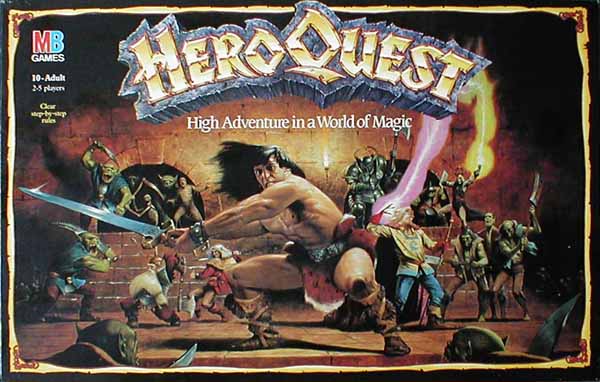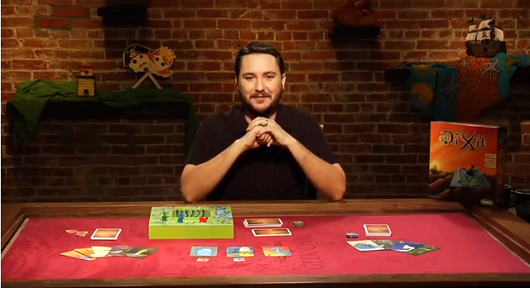When I was a young teenager I had some friends who introduced me to “Hero Quest.” I absolutely loved it. Every time we hung out I wanted to play, but eventually these other three friends didn’t want to play anymore and I haven’t really played tabletop games since. For those unfamiliar, “Hero Quest” is a board game that to my understanding is similar to “Dungeons and Dragons” (having not played tabletop games again, I could be wrong about their similarities) it involves a Dungeon Master of sorts, created characters, and dice. I’m sure I’m simplifying the game play but you get the point. Eventually I drifted away from those friends and I never met anyone who was interested in that sort of thing until I reached adulthood.

Over the years I’ve wanted to get back into those types of games but felt entirely intimidated by entering that door. There’s a local gaming/comic book store in my town, I’ll go there every couple of weeks and pick up some books, in the corner there may be some tables set up with some games going on. Those people seemed like they were born with a die in their hands and a board at their feet. It felt like an exclusive club that didn’t take new members. So I’d look casually at the games in their boxes, maybe pick a couple up and read the backs thinking maybe I could take it home and figure it out. But when I did get the chance to talk to someone about a particular game, it seemed so complex that I didn’t feel I could ever figure it out on my own. Approaching the tabletop gamers at the store also didn’t feel like a viable option. Unfortunately some establishments have an aura of elitism about them. Admitting that I was unfamiliar with the games felt like an invitation to ridicule, so I chalked it up to something that I would never be able to do, and enjoyed other things.
Then a couple of weeks ago I attended SaltCON, a tabletop gaming convention in northern Utah. It seemed like a good opportunity to familiarize myself with gaming, despite feeling like an unwelcome entity in enemy territory. I thought I would sit at our table, hand out some flyers, and maybe walk around and try to infer some information from a distance. Luckily I ended up with a group of people who were familiar with gaming and entirely supporting and friendly about my questions. I found that I really enjoyed the games and I’m glad that I went.
Then I was asked to cover the convention, to discuss my experiences and review a game or two. Of course I would do that, why else would we be there if not to cover the convention? But it hadn’t occurred to me. I felt like I was entirely unqualified to discuss gaming, I have almost zero experience, what insight could I possibly bring?
But the more I thought, the more I realized that perhaps that’s exactly what qualified me to talk about it. I can’t be the only person in the world who wants to learn about gaming but feels intimidated or confused by it. With that in mind, I humbly submit to you, a look at tabletop gaming from a complete non-gamer.
I assume that everyone reading this is familiar with board games in some respect, we’ve all played “Monopoly” or “Sorry!” Well essentially the same concepts apply, with the exception of entirely card based games, you usually have a token, dice, cards, and a board. The object of the game in one way or another is to use those elements to build up points or to move around the board. The games I played lasted between ten minutes and a couple of hours, with varying levels of strategy required.
If you’re interested in breaking into tabletop games I would recommend you do exactly what I did…
Attend a convention.
The whole intent of the people there is to spread the word about their game, to get more people to play. Without exception, everyone I talked to was gentle and friendly about all of my questions. I understand that conventions don’t happen every weekend and you may not want to wait, if that’s the case, head to a gaming store and just sit down and play.
Someone can explain the rules and the game play to you until their red in the face, but you’ll never really pick it up until you start rolling the dice. Unless you’re some sort of savant with untapped gaming talent, or touched and chosen by the token gods of Boardlania, you’re going to suck. Somebody has to lose and for your first few games at least, I’m betting that’s going to be you. Accept it. Because after you play the game a handful of times you’re going to understand it, you’re going comprehend the rules and start to see the strategies that your opponents employ. Even before you start winning, you’re going to have fun, and that’s what’s really important.
In addition, SaltCON (and I would assume by extension, all board game conventions) had a library of games you could check out free of charge, meaning you don’t have to take a 50 dollar gamble on something you may not enjoy. You can test drive as many games as you want and find out what you like before throwing down your money.
Find a group of people whose company you actually enjoy.
Remember that you’re going to be sitting at the opposite end of a table staring at each other’s mugs for hours at a time, and depending on the amount of players, you won’t be spending the entire time actually playing yourself.

Might not be so bad… he’s dreamy.
Like any game, there is competition involved and competition is more fun when the person winning isn’t a complete dick about it, if I had been called a “noob” or a “peasant” I probably wouldn’t have wanted to play ever again.
Once you understand how one game works, you’ll begin to understand how they all work.
Like the (entirely discredited) idea of The 100 Monkeys, simply by being around a bunch of other gamers, your brain begins to absorb the necessary knowledge. Okay, so that’s not entirely true, in fact it’s not true at all. But the games do all seem to operate with approximately the same mechanics so by the time you crack open your third or fourth game you’ve already got an advantage over the first game you played. Before you know it, you’ll be able to crack open a box and figure it out all on your own.
Don’t forget we live in an information super age.
There are an untold number of resources only a few keyboard taps away. You can learn a lot of basic information by watching reviews or videos of people playing games. You can probably see if a particular game is something you would be interested in investigating further in the privacy of your own home without ever having to interact with pesky humans. In particular I would recommend you check out Wil Wheaton’s TableTop. In each episode he gathers some friends and plays a different game, it will introduce you to a new game each time and the players are generally entertaining to watch/listen to.
Don’t be a jerk!
Once you obtain your gaming skills and reach the level of Grand Gaming Guru, don’t be a jerk. Don’t be one of the people who kept me away from gaming for so long. Tabletop gaming has the special requirement of involving other people. It’s not like reading a book, or watching a movie, or even playing a video game, it requires someone else to roll the dice with. It’s in your best interest as a gamer to be inviting and friendly, to foster new gamers so that you don’t run out of people to play with. It’s human to want to guard the things that are precious to you, it’s human to feel threatened when someone else steps into your proverbial territory, but it’s not productive and it’s in no one’s best interest. So knock it off, and make it easier for someone like me to hang out with you. It will be worth it, I’ll bring the soda (or the beer).
In short, it’s not as scary as it seems, it’s super fun, and you’d be doing yourself a favor to jump in. Take a risk. Roll the dice. Proverbially and literally.
Cheers.